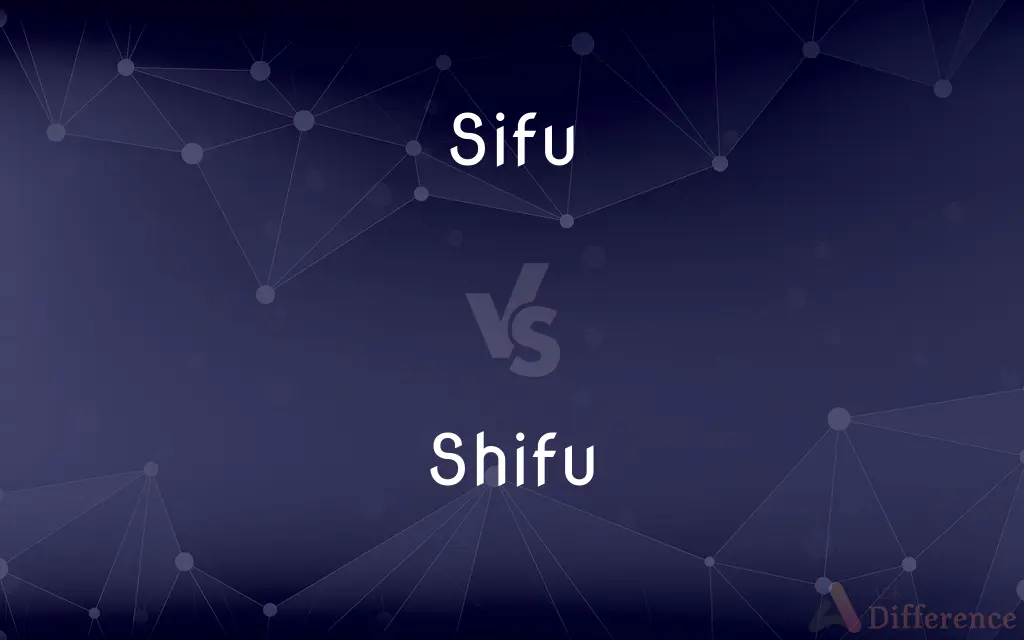Sifu vs. Shifu — What's the Difference?
By Tayyaba Rehman — Updated on December 25, 2023
Sifu and Shifu are essentially the same term, referring to a skilled person or master, especially in martial arts, with variations in transliteration from Chinese.

Difference Between Sifu and Shifu
Table of Contents
ADVERTISEMENT
Key Differences
Sifu is a term used in Chinese martial arts to refer to a master or teacher. It denotes respect and acknowledgement of skill and wisdom. Shifu, essentially the same term, is another transliteration from Chinese, reflecting regional or dialectical differences in pronunciation.
The use of Sifu is prevalent in Cantonese-speaking regions, often used in contexts involving martial arts training and instruction. Shifu, while conveying the same respect and recognition as Sifu, is more commonly used in Mandarin-speaking areas.
In addition to martial arts, Sifu can refer to a master in other disciplines, like traditional Chinese medicine. Similarly, Shifu is not limited to martial arts; it can also refer to an expert or skilled practitioner in various fields.
The choice between Sifu and Shifu often depends on the linguistic and cultural context, with Sifu being more familiar in Cantonese contexts, and Shifu in Mandarin. Both, however, communicate a deep level of respect for the person's skill and knowledge.
Both Sifu and Shifu embody the traditional Chinese concept of a master-student relationship, emphasizing respect, skill transmission, and the master's role in guiding the student's development in their art or craft.
ADVERTISEMENT
Comparison Chart
Language Origin
Cantonese
Mandarin
Common Usage
In martial arts, traditional arts
In martial arts, various disciplines
Cultural Context
More prevalent in Cantonese-speaking regions
More prevalent in Mandarin-speaking regions
Meaning
Master, skilled person, teacher
Master, skilled person, teacher
Application
Martial arts, traditional crafts, medicine
Martial arts, various crafts, disciplines
Compare with Definitions
Sifu
Sifu is a master or teacher in Chinese martial arts.
My Sifu taught me the importance of discipline in Kung Fu.
Shifu
It signifies a person with great skill and expertise in a particular field.
The Shifu of Chinese cuisine shared his secret recipes with his students.
Sifu
Sifu implies a deep respect for the person's knowledge and skill.
We all respected our Sifu for his wisdom in traditional Chinese medicine.
Shifu
Shifu also embodies respect and reverence for the master's wisdom.
In our dojo, we show utmost respect to our Shifu.
Sifu
The term is commonly used in Cantonese-speaking contexts.
In my Cantonese community, we refer to our martial arts teacher as Sifu.
Shifu
Shifu represents the traditional teaching and mentorship in Chinese culture.
The relationship with a Shifu is about receiving guidance in all aspects of life, not just the physical training.
Sifu
Sifu represents the master-student relationship in Chinese culture.
Learning from a Sifu involves more than just skill; it's about character building.
Shifu
The term is more prevalent in Mandarin-speaking areas.
While traveling in Beijing, I noticed everyone called their teacher Shifu.
Sifu
It denotes a skilled practitioner in a craft or discipline.
The Sifu of calligraphy demonstrated his art with grace and precision.
Shifu
Shifu is a Mandarin term for a master or teacher, especially in martial arts.
My Shifu in Tai Chi has been teaching for over thirty years.
Sifu
A master or teacher in the context of martial arts, especially kung fu and tai chi.
Shifu
Shifu (simplified Chinese: 师傅 or 师父; traditional Chinese: 師傅 or 師父; pinyin: shīfù) in Mandarin, or sifu in Cantonese, is a title for, and the role of, a skillful person or a master. The character 師/师 means "skilled person" or "teacher," while 傅 means "tutor" and 父 means "father." 傅 and 父 are pronounced with the same tones in both Cantonese (f6) and Mandarin (fù).
Sifu
A spiritual father in esoteric contexts.
Shifu
Synonym of sifu: the Mandarin Chinese-derived name.
Common Curiosities
Are Sifu and Shifu the same?
Yes, Sifu and Shifu are essentially the same, with differences in transliteration.
Can women be addressed as Shifu?
Yes, women who are masters in their fields can also be addressed as Shifu.
How is respect shown to a Sifu?
Respect to a Sifu is shown through formal greetings, attentive listening, and following their teachings.
Is Shifu a formal title?
Yes, Shifu is a formal title that conveys respect and recognition of mastery.
Do you need to be Chinese to be called a Sifu?
No, anyone who has mastered a craft or discipline can be referred to as Sifu.
Is the use of Sifu or Shifu limited to older individuals?
No, Sifu or Shifu can be used for any skilled master, regardless of age.
Can Sifu be used outside of martial arts?
Yes, Sifu can be used to refer to a master in other fields like crafts or medicine.
What qualities make a good Shifu?
A good Shifu possesses not only skill but also wisdom, patience, and a commitment to teaching.
Are there ceremonies to recognize a Sifu or Shifu?
In some traditions, there are ceremonies to recognize and honor a Sifu or Shifu.
Can someone be self-taught and still be a Sifu?
Typically, a Sifu is someone who has also learned under a master, passing down knowledge through generations.
Can a Shifu have more than one disciple?
Yes, a Shifu can have multiple disciples learning under them.
Is the term Sifu used in all Chinese martial arts?
While common, its usage can vary depending on the specific martial art and its cultural background.
How long does it take to become a Sifu?
Becoming a Sifu takes many years of dedicated practice and teaching.
Is the title Shifu used in other Asian cultures?
While similar titles exist, Shifu is specific to Chinese culture.
Can a Sifu still be a student in other disciplines?
Yes, a Sifu can be a master in one field while being a student in another.
Share Your Discovery

Previous Comparison
Deal vs. Sale
Next Comparison
Noncollegial vs. CollegialAuthor Spotlight
Written by
Tayyaba RehmanTayyaba Rehman is a distinguished writer, currently serving as a primary contributor to askdifference.com. As a researcher in semantics and etymology, Tayyaba's passion for the complexity of languages and their distinctions has found a perfect home on the platform. Tayyaba delves into the intricacies of language, distinguishing between commonly confused words and phrases, thereby providing clarity for readers worldwide.















































